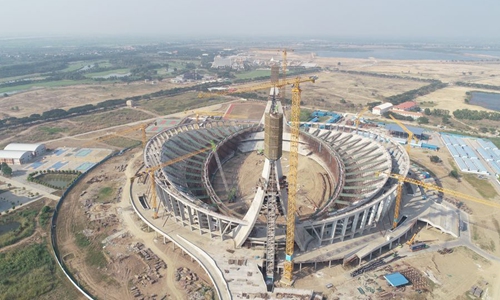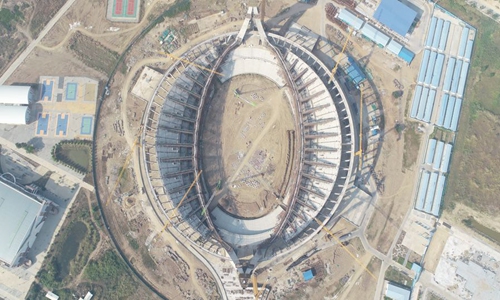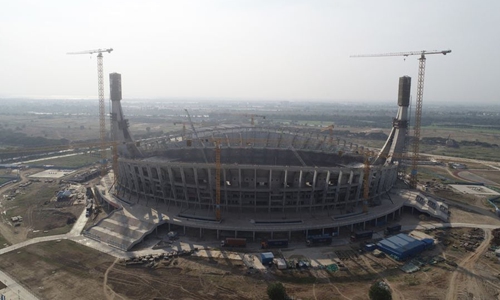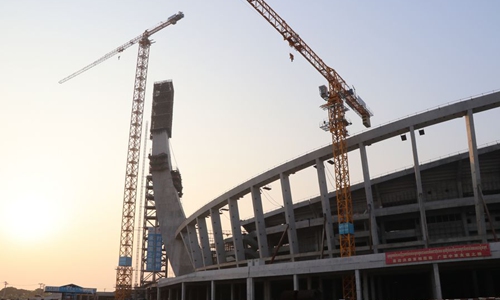HOME >> CHINA
China-aided stadium in Cambodia symbolizes friendship
Source:Xinhua Published: 2020/1/24 16:56:24

Aerial photo taken on Jan. 21, 2020 shows Cambodia's national stadium, which is under construction, in Phnom Penh, Cambodia. (Xinhua/Yang Huiliang)
Robed in a high-vis vest and crowned with a white hard-hat, Chea Samnang, a 25-year-old construction worker, is proud of working with a Chinese developer to build a China-aided main stadium here.
Standing on the terrace of the ongoing-construction stadium with the sun beaming down on him on Thursday, Samnang, a local man of medium height and build with dark skin, said he has worked as an electrician and plumber for the project since August 2018.
"I'm in charge of connecting water and electricity and installing air-conditioners," he told Xinhua. "I'm happy and proud of working with the Chinese company to construct this huge stadium."
"The stadium is very meaningful for the Cambodia-China relations and is vital to further develop our sports sector," he added.
The stadium has been developing by the China State Construction Engineering Corporation (CSCEC) under the Chinese aid of 1.1 billion Chinese yuan (about 160 million US dollars).
Workers are both Chinese and Cambodians. They worked actively during the Spring Festival season although the weather was typically scorching in the country at this time of the year.

Aerial photo taken on Jan. 21, 2020 shows Cambodia's national stadium, which is under construction, in Phnom Penh, Cambodia. (Xinhua/Yang Huiliang)
Giant cranes were used to deliver construction materials to upper floors, as some workers were cutting steel, others assembling steel structures, and the others plastering and smoothing concrete walls with cement.
Worker Hun Sok Leoun said with the project, he could learn new experience and get a better pay, 16 US dollars per day.
"As a Cambodian, I'm very proud of working with this project because in our history, there has never had such a huge stadium in Cambodia," the 35-year-old father of a daughter, told Xinhua. "It's the pride of Cambodia because, in our country, this stadium is the biggest of all."
ON TRACK FOR COMPLETION
Wang Qunqing, senior engineer and technical director of the project, said work on the 60,000-seat stadium began in August 2017 and the project will be completed on schedule, by December this year.
The 5-storey stadium covers a 16-hectare parcel in the 85-hectare Morodok Techo National Sports Complex, which is located about 18 km north of central Phnom Penh.
The stadium will serve as the main venue for tournaments when Cambodia hosts the Southeast Asian (SEA) Games in 2023.
According to the master plan, the 39.9-meter-tall stadium will be built in the shape of a sailing ship in which its both prows are 99 meters tall, and it will be encircled by an ancient Angkor-style moat.
Thong Khon, president of the National Olympic Committee of Cambodia, said the sailing ship symbolizes a long-standing traditional friendship between Cambodia and China because Chinese people used to travel by sailing ship to Cambodia in ancient times.

Photo taken on Jan. 18, 2020 shows Cambodia's national stadium, which is under construction in Phnom Penh, Cambodia. (Xinhua/Gao Bingnan)
He also praised the CSCEC for using advanced technology and high-quality materials for the project.
"I have observed that the company has very high responsibility and has used high-end technology for this stadium construction," he said. "In sum, the company has properly complied with technical standards."
Apart from the focus on the building quality, the Chinese developer has also paid high attention to workers' health and safety, Samnang said, adding that the workers have been provided with accommodations and three meals a day.
"They focus on our safety as number one priority," he said. "The company highly cares about our safety. For example, when entering the construction site, workers must wear hard hats, construction vests, boots and fall protection belts."

Photo taken on Jan. 18, 2020 shows Cambodia's national stadium, which is under construction in Phnom Penh, Cambodia. (Xinhua/Gao Bingnan)
FORGING FRIENDSHIP
Samnang said Cambodian and Chinese workers are like "friends", always help each other, and share good and difficult times together.
"In our workplace here, we give mutual help, regardless of Chinese or Cambodians, and work has gone smoothly," he said. "We share soft drink. For example, my Chinese supervisor, when he has soft drink, he shares it with us, and when I have it, I also share it with him, and he drinks it."
He said Cambodian and Chinese workers also lend money to each other when either side is in need of money.
"We borrow money from each other, for example, for a haircut," Samnang said. "I used to borrow money from Chinese twice. At that time, my daughter got sick and I was broke."
Sok Leoun agreed that cooperation and collaboration between Cambodian and Chinese colleagues are very good.
He added that although language is a barrier, Chinese and Cambodian workers still can work together smoothly through body language.
"Chinese colleagues have taught us on how to do this or do that, they are like our teachers... we've learned experience from them and will use it with other projects in the future," he said.
Posted in: DIPLOMACY,CHINA FOCUS